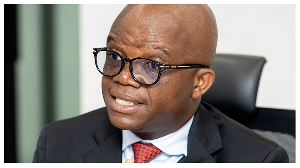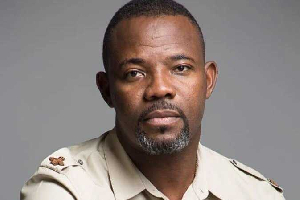Mankessim (C/R), July 3, GNA - Government is promoting an initiative called Local Economic Development (LED) to ensure a sustainable national economic growth and development.
The 2011-2015 Decentralization Policy, defined LED as, 93the process by which local governments, local businesses and other actors join forces and resources to enter into new partnership agreements with each other or other stakeholders to create new jobs and stimulate economic activity in municipalities, towns and villages".
Mr. Elvis Afriyie Ankrah, the Deputy Minister of Local Government, disclosed this to the Ghana News Agency (GNA) during a knowledge product advocacy meeting on Sustainable Rural Livelihoods Project (SRLP) at Mankessim in the Central Region. The one-day workshop organized by Africa 2000 Network Ghana (A2NG) with support from the UNDP, seek to sensitize partners about how these knowledge products develop since the implementation of the project and deepen the use of these products and concept for development.
The SRLP was established in 2006 by UNDP in the context of rural poverty in general which continues to exacerbate the plight of people living in deprived areas, making them vulnerable, and powerless to break away from the vicious circle of poverty.
Poverty is endemic in the three Northern Regions in Ghana whose Human Poverty Index shows higher deprivation in health, education and decent standards of living.
The project had worked together with other stakeholders to support variety of knowledge product including the Community Action Plan Training Facilitators Manual, the Ghana Developmental Information Portal, the Information Mediator Concept and a Review of 20 Years of Decentralization.
Mr. Ankrah said although LED would be driven by government, it needed the involvement of the private sector and civil society since "its success depends on our ability to mobilise public, private and non-profit actors".
He explained that the initiative was a multi-sectorial one that would evolve around other sectors of local development including infrastructure, social and the environment.
Mr. Ankrah said the country has had several development frameworks over the years including a ten-year Accelerated Development Plan in 1952, 1961 to 1968, 1975 to 1980, Vision 2020, Growth Poverty Reduction Strategy I and II aimed at propelling development yet poverty remained pervasive in various part of the country. "Previous national efforts to address poverty have not had as much impact as intended, it is evident that our fight to further reduce poverty needs not only to be multi-pronged but also much, much more strategic and innovative, based on an in-depth understanding and appreciation of the factors influencing poverty particularly in the rural areas", he said.
Mr Ankrah suggested the review of the approach of tackling poverty since new ideas and ways were needed.
"This is why we have reviewed the decentralization system and local government legislation to champion issues of local economic development."
Commenting on some of the tools of the SRLP, he said the Community Action Planning Manual, now provided government and stakeholders with a standardized approach for developing community action plans to help ensure that the country had credible information based on our communities, their resources and challenges. The tools, he said, would also serve as an excellent input into the District Medium Term Development Plans and make it easier for stakeholders to adequately address community level concerns. Mr Ankrah also noted that the information mediator model would serve a good platform for sensitizing and educating communities on government activities at the district and national levels and be constantly abreast of issues at the grass root level.
He expressed government's preparedness to make the tools part of the 91Better Ghana Developmental Agenda' to fulfil the stated priority of 93developing human resources for national development".
Mr K. Edem Senanu, National Project Coordinator of the UNDP and A2 NG 96 SRL Project, said the Project was developed to promote growth and reduce poverty in the deprived Northern Regions especially the most deprived districts by 2010 and is being implemented by Africa 2000 Network-Ghana (A2N).
He noted that the Project which was from 2006-2010 focused on particular attention to developing the capacities of communities in terms of individual capacity, organisational capacity to empower communities to take control of the development, implementation and monitoring of their Action Plans.
A key element of the approach, he said, was to centre on community assets, including social, physical, financial, human and political assets as well as all othe r available resources and potentials.
Mr Senanu said the approach had helped targeted communities to develop community action plans and identified and harnessed their assets towards the implementation of these Community Action Plans. "Communities are therefore not considered as complex masses of needs and problems, but rather as diverse and potent webs of gifts and assets. Each community has a unique set of skills and capacities that can be channelled into community development", he said.
Madam Charity Ahenkora Banya, Programme Specialist, Head of Sustainable Livelihoods Team, said the UNDP in 2006 decided to put into practice the policy advice by helping build the capacity of local people to propel human centred development to complement the fight against poverty.
She said the outcome of the project had demonstrated that people would be able to create wealth and manage their own resources if they had the right direction and support.
Business News of Sunday, 3 July 2011
Source: GNA
















